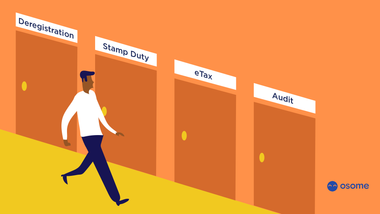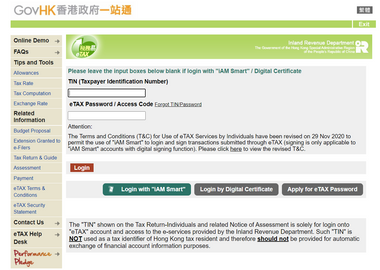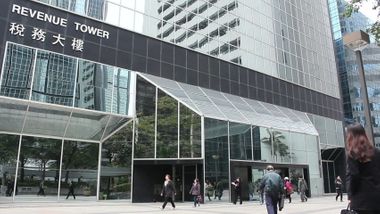A 4 Minute Guide to the Inland Revenue Department in Hong Kong
Once you open up a company in Hong Kong, you’ll be dealing with this government agency a lot. Learn more about its role, functions, and services in Hong Kong.

The Inland Revenue Department (IRD) in Hong Kong is the government body responsible for managing taxes and duties via eTAX and other services. This is also how the government earns revenue to fund its activities of governing the country. A constant part of running a company is paying taxes on income and profits earned. So, you’ll soon be well acquainted with HK's IRD.
Calculating the amount of taxes that you’ll have to pay is something all company owners would need to do themselves, but you don’t have to. Our experienced accountants are always a chat away.
Since its reunification with China, Hong Kong has followed the principle of "one country two systems"; it practises an independent taxation system. Only business profits, salaries and wages, and property rental income are subject to tax. It has no capital gains or dividends tax, and most interest income is tax-free. Essentially, only income and profits derived in Hong Kong are taxable there. This tax system is a major contributing factor to the economic development and competitiveness of this region.
What you’ll learn:
What Is the IRD’s Role and What Are Its Services?What Instances Would Businesses Need to Interact with IRD?
A Brief Explanation of One of HK’s Services: the eTAX
When Was the IRD Established?
Where Is It Located?
Who Is Its Commissioner?
What Is the Inland Revenue Department’s Role and What Are Its Services?

These are some of the services that Hong Kong’s IRD provides:
● Enquiry Service;
● Written Enquiries;
● Assessment of Tax Returns;
● Issue of Tax Returns to First-time Taxpayers;
● Company Deregistration;
● Tax Reserve Certificates;
● Objections;
● Tax Holdover Claims;
● Tax Payment;
● Refunds of Tax;
● Tax Audit and Investigation;
● Stamp Duty;
● Business Registration;
● eTAX;
● Complaints.
What Instances Would Businesses Need to Interact with the IRD?
At the very start of a company’s life stage, it needs to register with the Inland Revenue Department of Hong Kong. This could be done via the eTAX platform which we will explain further in this article. Each year a company is required to file a profits tax return annually with the IRD.
Typically, a company’s financial statements will have to be filed with the return. A two-tiered profits tax rate regime applies in HK, whereby the first HKD 2 million of assessable profits of a company is taxed at 8.25%, and any assessable profits in excess of that are taxed at 16.5%.
To be subject to profits tax, the company must both:
1- carry on business in HK and
2- earn profits from that business(es) which are sourced in HK.
Apart from profits tax, there are also salaries ones (on employees, with associated reporting obligations imposed on employers and employees and property tax (i.e. on property rental income), both of which would require businesses to interact with the IRD in Hong Kong.
A Brief Explanation of One of HK’s Services: the eTAX

eTAX is the Inland Revenue Department’s online tax services. It is easy to use and secure. By a single login to the eTAX Account, using the Taxpayer’s Identification Number (TIN) and eTAX Password, or a digital certificate, taxpayers could keep track of their tax position, manage tax affairs and communicate with the IRD directly.
E-alert messages on return filing and tax payment are also sent to HK account holders when the time limits for discharging these obligations are approaching.
It would be useful for you to get to know these are other features of the IRD eTAX:
● File tax returns;
● Apply for business registration and also extracts of registration particulars;
● Keep track of outstanding tax returns or payments (if any);
● Update personal and business particulars;
● Obtain an estimation of Salaries Tax payable;
● Make enquiries about personal tax matters;
● Apply for provisional tax holdover;
● Stamp property documents;
● Submit requests for assessment amendments;
● View tax returns which have been filed online.
● Assess tax assessments and payment acknowledgement.
When Was the Inland Revenue Department Established?
The IRD in HK was established on 1 April 1947. A little trivia: did you know that in Hong Kong IRD’s first financial year, 1947-48, HKD 14 million was collected? In the early days, the Inland Revenue Ordinance was the only legislation administered by the Department, covering salaries, property, interest and profits tax.
Later on, it was given the responsibility for estate duty, stamp duty, entertainment , betting duty, public dance-halls, business registration and hotel accommodation tax. Public dance-halls, interest, entertainment, estate duty and hotel accommodation tax have since all been waived.
Where Is It Located?
In late 2022, the majority of the offices of Units/Sections of the Inland Revenue Department were relocated to the new building, Inland Revenue Centre, 5 Concorde Road, Kai Tak, Kowloon, Hong Kong. For more information, take a look at this IRD announcement.

Inland Revenue Department's Commissioner and his Roles
Tam Tai-Pang has been the Commissioner of Hong Kong IRD since September 2022. Among his roles are to ensure that the IRD raises sufficient tax revenue for the government to deliver a wide range of social services, maintain the integrity of the tax system.
Our experienced accountants will be pleased to advise you on any processes that needs you to deal with the Inland Revenue Department. We could help you with registering your company with the IRD, file your taxes, and any other things in between! Simply drop us a chat.







